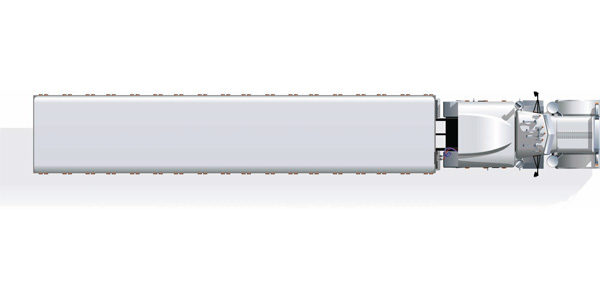Doing the right thing: interview with C. Randal Mullett

You're not likely to find a logistics professional who's experienced the trucking industry from as many perspectives as C. Randal (Randy) Mullett has. Mullett literally learned the business from the ground up, serving in jobs ranging from terminal manager all the way up to roles in the executive suite. Today, he is the top policy executive in Washington, D.C., for Con-way Inc., a $5.3 billion freight transportation and global logistics services company based in Ann Arbor, Mich.
Mullett's official title at Con-way is vice president, government relations and public affairs, but that doesn't begin to convey the breadth of his responsibilities. In addition to his policy-related activities, Mullett heads up the company's corporate communications function, which encompasses social responsibility. He also serves as Con-way's chief sustainability officer, with responsibility for corporatewide initiatives aimed at improving economic and environmental sustainability through practices that boost operating efficiencies and cut carbon emissions.
Mullett met recently with DC Velocity Group Editorial Director Mitch Mac Donald to talk about social responsibility programs, how these initiatives are changing the logistics landscape, and why trucking companies will never be as popular as Starbucks.
 Q: We've spoken often about the importance of social responsibility for corporate America. How do you define corporate social responsibility?
Q: We've spoken often about the importance of social responsibility for corporate America. How do you define corporate social responsibility?
A: It is concentrating on things that add social value for stakeholders. For a long time, the prevailing mentality among businesses was that we were just here to make money and that we were solely charged with driving economic value for the shareholders. It has become very clear to us that changing demands of customers, including the communities that we live and work in, government, and all kinds of other external stakeholders are really focused on the notion of social value as well.
At one time, social responsibility was largely about the environment. Now, I think more and more people think beyond pure environmental sustainability to things like sustainable business models, giving back to the communities you operate in, and making your employees and their families feel like the organization they're involved with isn't just supporting them financially but also shares common values and is taking the higher road, so to speak.
Q: In the past, companies have sometimes hesitated to take this path because of concerns about cost. But doing good and doing well financially—driving shareholder value—don't have to be mutually exclusive, do they?
A: No, they are not mutually exclusive at all. In fact, a ton of academic research in recent years indicates that corporations that have social responsibility programs see other kinds of benefits. They see better retention. They see higher employee engagement. They see their employment brand go up. From a sustainability and environmental sustainability point of view, if we can use less energy, that is better for us. If we use less water, that is better for us. A lot of these are two-fers, so you're right to say they're not mutually exclusive. But it does take people a while to get their heads around it because in many instances, this is a leap of faith.
Q: We've seen an uptick in interest in corporate social responsibility initiatives in the past few years. What's driving that?
A: There are several things. Number one, the so-called news cycle. Everything is instant. Unfortunately, people learned the hard way that if you don't manage your reputation correctly, it can really have a big downside. So people started looking for ways to burnish the corporate reputation and out of that came a realization that if you manage the social responsibility end of things, there are a lot of other benefits that people didn't anticipate.
Another is energy costs. They have gone through the roof at the same time the environmental movement has been gaining a lot of momentum and a lot of support from governments in the developed world.
I think the last thing is the changing nature of the employee.
Q: Meaning?
A: Twenty years ago, it wasn't unusual for someone to go to work for a company and end up staying there forever. It was lifetime employment, and your social activities, your community activities, they all took place outside of that business. Well, now, people change jobs a lot more frequently, and often they change jobs because they're seeking a good fit between their priorities and those of their employer.
People, more so than ever, want to feel good about the company they work for. They want to feel good about going to work. They want their family to be proud that they work there. Think of a company like, say, Starbucks, which gets all its coffee from organic farms and prides itself on ethical labor practices. Twenty or 30 years ago, that didn't factor into people's thinking to the extent it does today. We see this especially with the younger generations in the workforce.
Obviously, that poses a bit of a challenge for the trucking business, where we are big users of fossil fuel and maybe hold people up in traffic on the highways. We don't get that "Cool, I love those guys!" reaction [when our company names are mentioned] a whole lot, so we've got some work to do in this industry.
Q: Do you think corporate social responsibility is a bigger issue for logistics than for other sectors of the economy?
A: Perhaps, to an extent. We're not necessarily seeing a lot of people asking about our broader social initiatives, but there is an awful lot of interest in carbon footprint, carbon neutrality as far as your shipping goes, and just general energy use reduction. Most of that came out of efforts by large international shippers to comply with laws in other parts of the world or the push to get "good guy" points when the environmental movement began to take hold in the United States.
In the past from a logistics point of view, there were only a couple of things you had to worry about—price and service. Now, people are throwing environmental considerations into the mix, so now it is price, service, and narrowly defined sustainability around the carbon footprint. Back at the height of the cap-and-trade debate in the United States, people tried to get out in front of that, and they discovered that, gee, some of this isn't mutually exclusive and we can make some good advancement decisions around this.
Though that debate has died down in the last couple of years because of the economic downturn, the issue is going to resurface. Regulation is probably going to come in the future, and they've got to figure out a way to get ahead of that, and at the same time, they are reducing their carbon footprint, they are really reducing their energy usage. It ties very nicely with how you get more efficient.
We're finding that clients that once might have come to us and said, "Here's where my plants, suppliers, and customers are located; let's talk about the most energy-efficient way to move our freight" are now saying, "Gee, let's look at re-engineering the entire supply chain, the entire value stream." We are getting lots of questions about near sourcing and putting production closer to markets. We are seeing a rise in interest in more in-depth 3PL and 4PL services, where we are actually becoming their lean departments for them and teaching their businesses how to lean out their processes.
Q: Would you say that companies that aren't taking a look at these sorts of initiatives could be putting themselves at risk in the long term?
A: I'm not sure that I would term it a risk to a company's very survival, but it certainly puts businesses at a risk of not recovering as quickly when the economy starts to come back. That's where we see the differentiators happening—and again, we're not talking about the feel-good stance; we're talking about improvements in energy usage, improvements in corporate reputation, becoming the employer of choice, and so forth.
Q: If someone were to ask you for advice on how to get a social responsibility initiative up and running, what would be on your short list?
A: Benchmark against the people out there that are using best practices. We have done a lot of that and continue to do that ourselves, even when we feel like we are making pretty good progress. The other thing I would stress is the need to have champions for the initiative at the very, very top. This is not one of those things that can bubble up from the bottom. If the executive team is not behind this, it won't work.
Q: Any closing thoughts?
A: I can't put a big enough exclamation point on the statement that the deeper we get into this, the more we surprise ourselves with the value that is derived. It has just been stunning to me. You know, you expect better employee engagement and you expect good results. You expect people to notice externally. It has just been impossible to overestimate how that would happen and how much people in the company were starved for this sort of thing and have jumped on board with both feet.
Related Articles

Copyright ©2024. All Rights ReservedDesign, CMS, Hosting & Web Development :: ePublishing